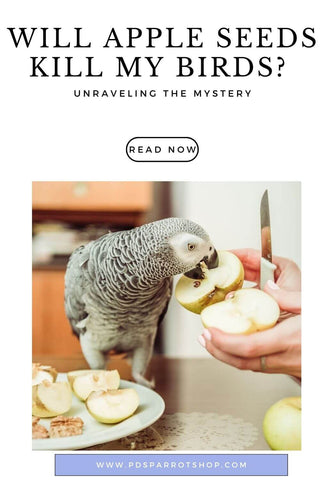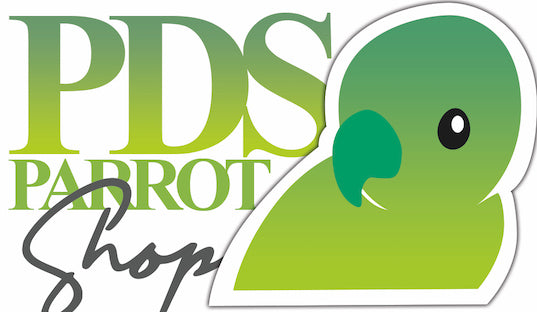
Will Apple Seeds kill my Birds? Unraveling the Mystery
Share
You might have stumbled upon alarming claims on social media about apple seeds containing cyanide and posing a deadly threat to birds and animals. The fear of harming our pet birds can be distressing. But is this concern warranted, or is it just a case of misinformation? In this comprehensive article, we will delve into the world of apple seeds, cyanide poisoning, and the safety of our avian companions.

Pin Me!
Cyanide is a word that often triggers fear and panic, and understandably so. However, when it comes to apple seeds, the situation is not as dire as it may appear at first glance. Let's explore the facts.
Apple seeds contain a substance called amygdalin, which releases cyanide when metabolized. The key question is whether this tiny quantity is sufficient to harm birds and other animals. To find out, we need to consider the science behind it.
What Can We Learn from Nature?
Nature often provides us with valuable insights, and observing the behavior of birds around apple trees is enlightening. If apple seeds were genuinely lethal to birds, one would expect to see casualties in orchards across the world. However, in reality, this is not the case.
The Science Behind Cyanide Toxicity
Whenever uncertainty arises, science steps in to clarify matters. To determine if apple seeds pose a significant risk, let's break down the science.
The Amount of Cyanide in Apple Seeds
To put things into perspective, a 100-gram bird would need to consume and thoroughly chew over 50 apple seeds in a single sitting to ingest enough cyanide to cause a problem. This is an astonishingly large number of seeds for a bird to consume in one go.
The Role of the Kidneys and Liver
Moreover, even if a bird were to ingest a considerable number of seeds, the toxicity of cyanide is low due to its rapid breakdown by the kidney and liver. These organs serve as natural detoxifiers in many animals, including birds.
Personal Experiences and Research
Understanding the science behind the issue is reassuring, but personal experiences can provide valuable insights too. Like many of you, I too was concerned when I suspected that one of my birds had ingested an apple seed. However, a bit of research yielded a wealth of reliable information.
The Verdict: Apple Seeds and Cyanide
So, what's the bottom line? Can apple seeds truly harm your birds or animals?
The answer is reassuring: Apple seeds do not contain enough cyanide to pose a threat to your avian friends. If your bird happens to ingest apple seeds, you can rest assured that they will not be harmed. Nature has its safeguards, and science supports the idea that apple seeds are not the danger they might seem.
Frequently Asked Questions (FAQs)
Q: Can apple seeds kill birds or animals?
A: No, apple seeds do not contain enough cyanide to be lethal to birds or animals. They would need to consume an extremely large quantity of seeds to be at risk.
Q: Are birds safe to eat apples, including the seeds?
A: Yes, birds can safely eat apples, seeds and all. Apples are a part of many birds' natural diets.
Q: Should I be concerned if my bird accidentally ingests an apple seed?
A: No, accidental ingestion of an apple seed is unlikely to harm your bird. Their kidneys and liver efficiently detoxify any small amount of cyanide.
Q: What happens if a bird consumes a large number of apple seeds?
A: Even in the rare event that a bird consumes a large number of apple seeds, the toxicity is low, thanks to the detoxification processes of the kidney and liver.
Conclusion
In conclusion, the fear of apple seeds and cyanide poisoning, especially in the context of birds, is largely unfounded. While it's essential to exercise caution and provide a safe environment for your pets and wildlife, you can relax knowing that apple seeds are not the danger they are sometimes made out to be.
So, go ahead, enjoy your apples, and share them with the birds and wildlife. They'll appreciate the treat, seeds and all.
More Articles on Bird Health
Exploring Vitamin A Deficiency: Understand the causes, symptoms, and prevention of vitamin A deficiency in pet birds. Learn which foods and diet strategies can help keep your parrot’s immune system strong and overall health optimal.
Toxic Respiration Hazards for Pet Birds: Learn about the common household toxins and fumes that can harm your bird’s respiratory system. Understanding these hazards is essential for keeping your parrot healthy and safe at home.
Zoonotic Diseases in Pet Birds: Learn about diseases that can be transmitted between birds and humans. Understanding these zoonotic risks is crucial for keeping both your parrots and your household safe and healthy.
Monika Sangar, MSc – Molecular Biology | Avian Nutrition Specialist | Founder: PDSnonprofit | Owner: Pds Parrot Shop
Monika Sangar is a parrot rescuer, bird food chef, and toy designer with over a decade of experience in avian care and nutrition. She is the founder of Prego Dalliance Sanctuary and the author of The Science of Avian Nutrition, a cookbook dedicated to fresh, healthy meals for parrots. Explore more bird care tips and bird toys at PDS Parrot Shop!

